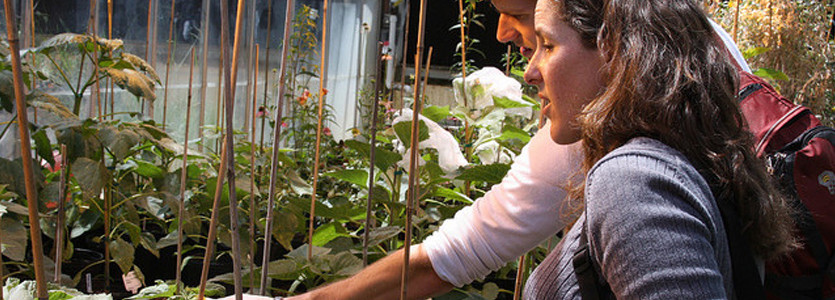
We’ve all heard about how important STEM is to the future. Science, technology, engineering and math are the fields of the future. So what are some of the many STEM careers? Here’s a look at five possible STEM occupations in science, with details on what and where you might study in college.
Agricultural Scientist
Agricultural scientists study farm crops and animals and can help determine ways to increase production on farms. They may also address issues like soil conservation, plant cultivation and animal husbandry.
In high school, being involved with organizations like 4-H and FFA, a student organization that encourages agricultural education, and taking classes like calculus, statistics, biology, chemistry and environmental science can help students prepare to major in agricultural science.
Entry-level positions require a bachelor’s degree. For other jobs — including some positions in the federal government, private industry and research — a master’s degree or doctorate degree may be needed. Undergraduate classes might include agriculture business, agriculture economics and agricultural technology, as well as animal science, crop science and soil science.
Each state has land-grant colleges that were founded, in part, to teach agricultural practices (examples: University of Georgia, University of Idaho, Massachusetts Institute of Technology, North Carolina A&T State University), though many other schools offer agricultural science degrees.
Those with degrees in agricultural science might work for the local, state or federal government in departments like Forestry Service or the USDA or in state or national parks. Other jobs are available at agribusiness firms, professional associations, camps, Scouting organizations, nature centers and publications that cover agricultural and wildlife issues.
Astronomer
Astronomers study the planets and stars, as well as galaxies and black holes. While people might think that all astronomers do is look out of a telescope, these scientists actually spend more time researching, doing data analysis and teaching than gazing at the stars.
Aspiring astronomers will take many classes in physics and advanced mathematics. There are only around 7,000 professional astronomers in the U.S., so the field is very competitive and students are expected to maintain excellent grades, even in their undergraduate work. Those working in the field often have a doctorate degree.
Colleges that offer bachelor’s degrees in astronomy include Boston University, Columbia University, the University of Florida and the University of Illinois Urbana-Champaign, according to the American Astronomical Society.
More than half of professional astronomers are employed by colleges and universities, either as professors or at observatories or laboratories associated with the institutions, according to AAS. Other astronomers work for the federal government, at facilities supported by the government, in science museums or planetariums or as high school earth science or physics teachers. Astronomy degrees also prepare students for jobs in the aerospace industry, computer science, industrial research and science journalism.
Geologist
Geologists study the materials that make up the Earth (think: rocks and water) and how those materials affect the planet (think: floods, volcanoes and earthquakes), as well as its history (think: fossils). Using a combination of elements of biology, chemistry, physics and earth science, geologists try to understand nature, tracking what’s happened on Earth over time and how it might change in the future.
College classes for geology majors might include paleontology, geophysics, analytic geometry and calculus. Students can expect to do fieldwork that can involve anything from exploring caves to camping in the mountains.
The top five colleges for geology graduate programs, as ranked by U.S. News and World Report, are the University of Arizona, the University of Michigan, Pennsylvania State University, University of Texas at Austin and Stanford University.
Geologists might work for petroleum or mining companies, in research laboratories, as environmental consultants or for the state or federal government. There are also opportunities for geology majors in the education field.
Medical Scientist
Medical scientists work to improve people’s health by doing research on the causes of diseases and ways to prevent and treat diseases. They may work to develop vaccinations and medicine and study how new drugs work in clinical trials.
Aspiring medical scientists should major in biological science in college and take as many classes in biology, chemistry, physics and math as possible. Many colleges and universities offer biology majors and/or pre-med programs. While a science degree is not required to get into medical school, it is a good first step.
After graduating with an undergraduate degree, students interested in medical science can choose to pursue a doctorate in medical science, specializing in an area such as genetics or pathology. These programs take around six years. The second option is to enroll in a joint program at a medical college and earn both a doctorate and a medical degree, learning both research skills necessary to become a scientist and the clinical skills needed to be a physician, according to the Bureau of Labor Statistics. These programs typically last seven or eight years.
Medical scientists may work for the federal government or at universities. They might also have jobs at scientific research firms, private hospitals and pharmaceutical and medicine manufacturers.
Zoologist
These scientists study animals, including their characteristics, activities and habitats. Field work to study animals in their natural environments is common.
A bachelor’s degree in a subject like zoology, biology, ecology or animal science is required for work in this field, with a master’s degree needed for more advanced work. An understanding of data, with coursework in statistics and computer science, is important for those who will be focusing on research. Those who are interested in teaching at the college level or doing independent research typically need a doctorate. Colleges that offer degrees in zoology include Auburn University, Colorado State University, Kent State University, Oregon State University and Texas A&M University.
Animated gifs via GIPHY
Career paths in zoology include zookeeper, animal and wildlife educator and animal behaviorist. People with zoology degrees may get research jobs at colleges and universities, with the government or in private industry.





Leave a Reply